

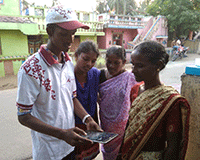
As India aims to move more and more towards the vision of a cashless economy, it is important to include rural communities into the ambit of a Digital India as well. Given that as much as 67 per cent of India’s population lives in rural India which is dependent on cash transactions, the goal of a cashless economy can never be achieved unless digital infrastructure is made available at the last mile and communities made aware and trained to use the same to carry out financial services. With a population of more than 1.2 billion, the country has only about 24.51 million credit card holders and 661.8 million debit card holders; and not all of them use their cards actively. Even the number of ATMs is restricted to a little more than 200,000 with only 75,000 located in semi-urban and rural areas. Even at its highest capacity, Paytm reaches only 150 million users across India. According to a report by the Internet Society, 50% of Internet-enabled mobile phone users in South Asia don’t even access the Internet on their phones.
With this realisation in mind, Digital Empowerment Foundation (DEF), in partnership with Axis Bank, has been striving hard to provide digital financial literacy and services to rural and remote communities of India. A joint initiative launched in 2017, project DigiPrayas was implemented in 12 panchayats across five states to help local communities in the region understand the importance of digital financial services and become equipped to access basic functional digital financial services. Now in its second phase, project DigiSupport follows up on the efforts made under DigiPrayas to convert digital financial literacy and awareness into digital financial services. Under this leg of the project, rural youth have been engaged and trained to become DigiPreraks in remote villages of seven Indian states where banking facilities are limited and need for digital financial literacy is high. Read More


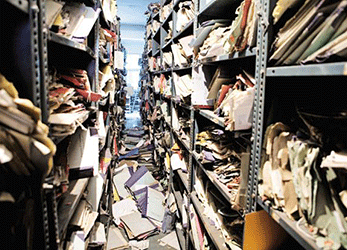



Public libraries in India are struggling to remain relevant and sustain themselves in the digital era. The public libraries have, especially, served well to the youth in smaller towns of India, who have limited resources to access knowledge. Our former Prime Minister, Shri PV Narasimha Rao utilised the only public library in Warangal district of Telangana then to educate himself and rise from a small town to achieve prominence in the Indian politics. The Indian Public Library Movement (IPLM) has been conceived to re-vitalise the Indian public libraries and bring them back into the mainstream as inclusive knowledge and information centres. Read More
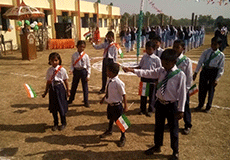
Republic Day was celebrated with great fervour at various Community Information Resource Centres (CIRCs) on January 26, 2018. CIRC Ranchi even organsied a special event to celebrate the occasion with schools students and teachers from a local private school. Following the flag hoisting, children and teachers discussed on the importance of the Constitution of India, and engaged themselves in singing and dancing competitions. Games were organised, and teachers played patriotic songs on YouTube to bring alive the spirit of togetherness and secularism among children and their families.

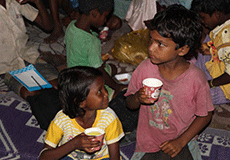
Last month, the CIRC in Jauhar Academy organised a daan programme in Jagannathpur, a remote village in Jharkhand, to distribute clothes among the poor. The CIRC team mobilised the community via group meetings and social media tools, especially WhatsApp and Facebook, to gather warm clothes, bed sheets, stationery, utensils and other basic necessities from community members. CIRC Jauhar Academy now strives to launch a larger donation drive to mobilise a wider community through its social media network and field support to share people’s surplus with those in need.

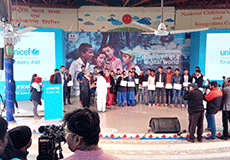
Students and coordinators of seven CIRCSs from the states of Jharkhand, Madhya Pradesh, Bihar, Rajasthan, Maharashtra, Odisha and Tamil Nadu were identified and invited for a special event that marked the launch of UNICEF’s recent publication, The State of the World’s Children 2017: Children in a Digital World. The event was hosted in New Delhi from December 15-17, 2017, and it allowed digitally literate students from rural parts of the country to engage with students and engineers from other states to find IT-driven solutions to social problems. Students used digital tools and ICT to learn, play, socialise, seek advice and express themselves at the event.
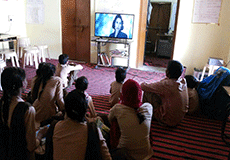
CIRC Kooran, located in the interiors of Rajasthan, has mobilised and enrolled several new school students under its digital literacy programme this year. These students are not only learning the basics of computers, fundamentals of Word, PowerPoint and Excel, but are also engaging in digital edutainment activities. The centre regularly screens videos and films to teach children values of bravery, team building and sportsmanship. A keen bunch of students, some of them have even learnt to set up projector and AV player so that they can facilitate the screening on their own, thus feeling ownership for the centre.
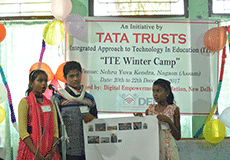
“All work and no play makes Jack a dull boy, all play and no work makes Jack a dull boy,” believes Maria Edgeworth, a prolific Anglo-Irish writer of adults' and children’s literature. With a view to provide space for work and play, the ITE Centre in Nagaon (Assam) organised a three-day winter camp at Nehru Yuva Kendra from December 20-22, 2017. Integrated Approach to Technology in Education (ITE), an initiative of Tata Trusts implemented in Assam by DEF, is an innovative education programme aimed at fostering higher order learning among primary and upper primary students across India. Read More
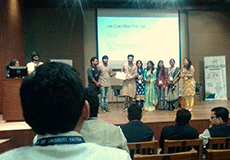
Preeti Kumari from Lalganj is an Internet Saathi from Vaishali district of Bihar who was selected to attend a 15-day-long Jagriti Yatra. The national train journey with 500 young social entrepreneurs covers a distance of 8,000 kilometres across the length and breadth of India to understand ideas that can build a stronger and efficient India. These 500 young minds travel together to meet and interact with 15 mentors—from the fields of science, art, music, social development and business—who have worked towards creating a large-scale impact. Preeti runs a rural micro enterprise that makes bangles and fashion accessories.
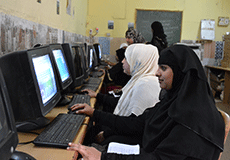
CIRC Bengaluru is committed to improving digital literacy levels among underprivileged women living in semi-urban parts of the city. The ground staff in Bengaluru, Karnataka, often engage in door-to-door mobilisation, during which they assess the needs of the community and inform them about how digital tools can address their needs. So far, the centre has received overwhelming response from women in the community, most of who come from minority communities living in nearby slums. They believe digital literacy is able to give them the confidence to learn something new, a trait they thought they lacked.
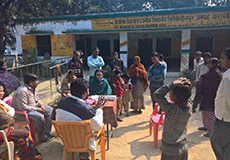
The ground staff of Baank-e-Loom project in Saidanpur, Uttar Pradesh, was extremely motivated last month to organise mobilisation and digital awareness in the villages of Kewlapur, Turkani, Mushkabad and Bikauli. Local staff member Utkarsh Rajawat organised another session in the community to address barriers of girl child education. “Barriers that restrict a girl child from pursuing an education must be challenged,” he said. Utkarsh and his team also helped in the re-enrollment of a couple of school students who had been taken off the school records due to some errors on their Aadhaar cards.

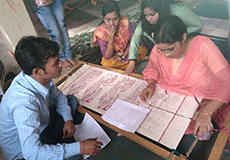
Project DigiKala, under DEF's Digital Cluster Development Programme, carried out a survey in Barpali, Odisha, to assess the possibility of product diversity and costing. This survey was carried out by a team from the Indian Institute of Handloom and Textile (IIHT) in Bargarh. At present, weavers in the cluster make sarees, suit material and dupattas but it will be a challenge to encourage the weavers to put in more time and effort to diversify the range. However, small efforts have been put in place, and some weaver households have begun to make table cloth, mobile cases, vanity bags and purses. DigiKala is an initiative of DEF and Microsoft.
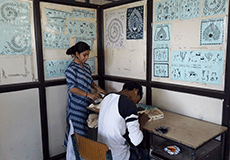
Last month, DEF conducted an awareness workshop for Warli artisans in Talasari block of Maharashtra. Organised at the Pratham Warli Art Centre, the session saw participation of 36 Warli artists, students and other stakeholders who discussed the challenges related to market availability, designing, raw material and pricing. Artists were encouraged to join producer groups to better utilise their skills. Soon, digital interventions will be introduced in the cluster to provide artists with efficient marketing platforms. DEF has begun work in Warli in partnership with UNDP in an effort to improve the livelihood of Warli artists through digital interventions.
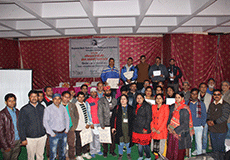
eNGO Programme organised a two-day workhop on ‘Mobile Internet Literacy' in Dehradun on January 20-21, 2018. The workshop, organised in collaboration with Digital Saarthi, saw participation of 100 representatives from va rious non-profits curious to learn how the Internet can be leveraged at the panchayat level. Exclusive panchayat websites, Google search, governance-related apps, and social media were topics of key focus at the workshop. Another closed-group workshop was organised in Gurgaon on January 30 for seven NGOs that came together to learn about digital content, website management and crowd funding.

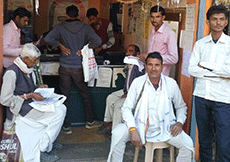
Supported by Oracle and CAF India, CIRC Madhusudangarh in Madhya Pradesh has enabled farmers and other community members to avail various government schemes and entitlements. Due to lack of information, people are often left in the dark about the various government services that they are eligible for or are unaware of the process of availing the same. The ground staff at Madhusudangarh has thus been ensuring that farmers are aware of and able to reap the benefits of schemes like Pradhan Mantri Fasal Beema Yojna, which promises crop insurance to farmers, among others. Read More
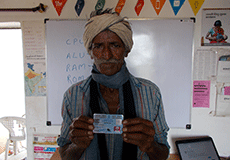
People living in village have to often travel long distances to even get a document photocopied. The hassle is even more when one has to get government documents such as PAN cards and Aadhaar cards. Realising the inconvenience that people in villages have to face in terms of commuting and finances, Soochna Seva Kendra in Guna (Madhya Pradesh) has decided to utilise its CSC license to take on the responsibility of making PAN cards for people of select panchayats. The Kendra has already registered 65 people for PAN cards so far, and has even distributed PAN cards to 50 of them. Umri post office has been extremely helpful in this mission.


The Research and Advocacy department of DEF has sent its response to the Srikrishna Committee call for a Data Protection Framework for India. DEF’s recommendations highlight the need for a robust data protection law to protect, especially, the most vulnerable sections of the society. The response sent by DEF can be read here. Meanwhile, DEF has received a grant from APC to conduct a research on e-Waste management in India. The Green Prakriya project will study e-Waste management in India, its implications on human rights, and conduct a cost-benefit analysis of the current scenario in India.


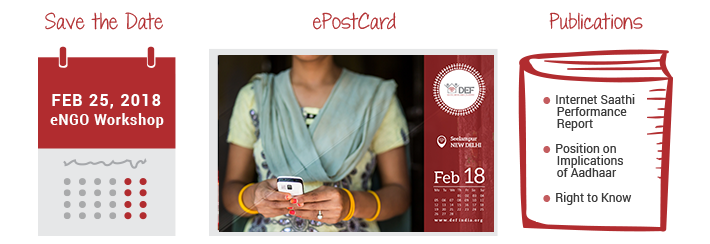

start-up principles for better impact
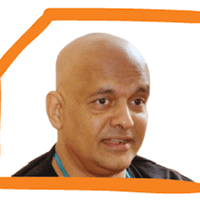

Commercial transmission losses due to electricity theft run into millions of rupees every year. Add to this unbilled consumption and non-payment of dues, power distribution companies (discoms) suffer massive losses. Engineers at Jabalpur-based Madhya Pradesh Poorv Kshetra Vidyut Vitaran Co. Ltd (MPPKVVCL) have developed a smart box which can be installed on electric poles. These boxes with internal circuitry are equipped with a GSM mobile SIM card. No changes in the transmission and distribution systems are required. The smart box was the winner at the DEF’s awards 2017 in the “Early Stage” category. Read More
House No. 44, 3rd Floor, Kalu Sarai, New Delhi | def@defindia.net | www.defindia.org | +91-11-26532786




